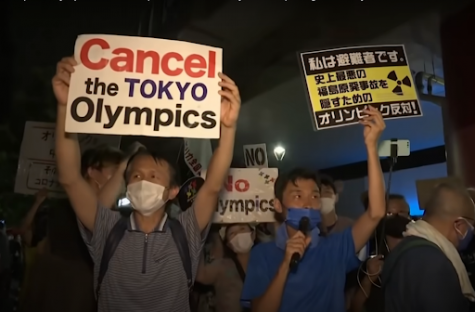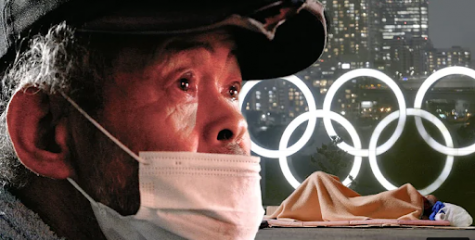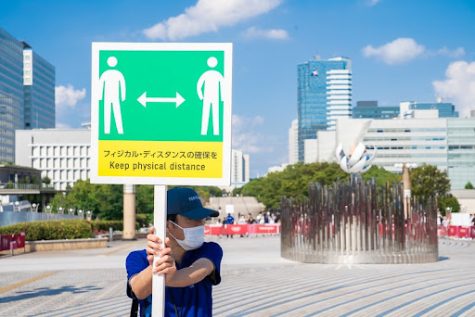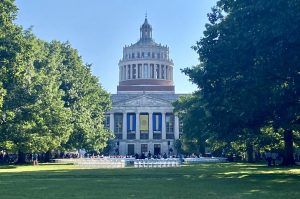Remembering the 2020 Olympics: an empty promise with a great cost
December 1, 2021
The 2020 Tokyo Olympics is indisputably one of the most significant events that took place this year— not only nationwide but also on an international scale. However, such an important event was accompanied by big and small controversies. In early February, Yoshiro Mori, the head of the Tokyo Organising Committee of the Olympics and Paralympic Games, received fierce criticism for his sexist statement that women talk too much and that meetings with female directors are time-consuming. Furthermore, there was a strong group of citizens opposing the holding of the games during the pandemic. It was very apparent that holding the Olympics would not be a smooth process from the very start. Despite the difficulties, the Olympic Games were eventually held from June 23 to August 8, 2021. Looking back at the games now, it is true that the games did provide some feeling of solidarity among athletes and the audience. Nevertheless, many still firmly believe that the games should have been canceled—or at least postponed to the next year—since the risks Japan took regarding the economy, social issues, and the global pandemic were too significant to be sugarcoated by such intangible benefits.
To begin with, the Tokyo 2020 Olympics failed to provide Japan with the financial benefits of regular (non-pandemic) Olympics, but instead, put more burden on the Japanese economy. In former Olympic events, profits came from international tourists who visited the country to watch the games. The tourists, who spent weeks in hotels near stadiums, would tour around the city and consume goods. The previous Olympics also advertised to promote the country, attract more people, and develop international trading connections. However, the Olympics that took place this year were completely different. To prevent the spread of COVID-19, Japan banned foreign spectators. The absence of an audience in the games meant that Japan could not earn profit by selling tickets and opening tourist activities. In a report from the Nomura Research Institute, Takahide Kiuchi, an economist at the Nomura Research Institute,states that this would cause economic losses of $1.4 billion. Such profit was crucial to make up for the debt caused in building Olympic stadiums and organizing events, and without them, Japan would inevitably have to face financial problems. What makes the situation worse is the excessive amount of money that was invested in the Olympics. According to the Guardian, the money spent organizing the games was over-budget by 111%, which Japan could have used to build 300 new 300-bed hospitals or 1,200 elementary schools. This also angered citizens since six billion dollars of public tax money was put into the games, but the games were held without an audience.
A mixture of fear and confusion toward the Olympics was seen in the protests that occurred before the Tokyo 2020 Olympics opening ceremony. In an interview with the NHK, a 35-year-old woman who participated in a protest at Harajuku station summarized the feelings of the Japanese people: “I was originally excited for the Olympics but there are things we need to prioritize right now. I believe letting the Olympics take place is questionable, and so I decided to take part in the protest.” These protests didn’t just take place in Japan, but all over the world. Protesters gatecrashed a press conference with the IOC with signs reading “No Olympics anywhere. We don’t want the Olympics. No Olympics in LA. No Olympics in Tokyo.” The unpopularity of the Tokyo 2020 Olympics increased significantly as citizens suffered through the COVID-19 pandemic— a time of uncertainty where people have lost loved ones, faced financial problems and have even become homeless. Even though the games were promoted as a symbol of peace and hope, for people who had gone through hardship during COVID-19, they symbolized another risk, which led to the protests. The fact that the International Olympic Committee and the Japanese government continued with the Olympics even after so many people were strongly against it raised the question: “Who was the Olympics for in the first place?”

Photo credit: The Guardian, YouTube
Another severe social issue that resulted from the Olympics was the pressure on the homeless population in Tokyo. Homeless people were forced to hide away from sight. The Japanese government came up with regulations so that the parks were closed and lit during the night to discourage the homeless from staying there. The purpose of these regulations was to make Tokyo look like a “cleaner” and “wealthier” city to foreign reporters and athletes. A 62-year-old homeless man who had lived near the Tokyo Metropolitan Government’s Building in Shinjuku Ward said that a government official approached him on July 8, telling him to remove his belongings by July 21 because they were creating obstacles for road management. In the past, the homeless were able to settle down in a particular spot for at least a month or so, but because of the Tokyo Olympics, they were forced to look for places more often. This made the lives of the homeless extremely difficult during the Olympic season.

Photo credit: BBC Youtube
The biggest problem in the Tokyo 2020 Olympics was the mismanagement of the pandemic in Japan and in the games, that led to a surge in COVID-19 cases. Just the day before the opening ceremony, Tokyo had over 5,000 new COVID-19 cases. This number steadily increased, reaching record-breaking numbers every day during the games and well after. A two-week event that was held in late July had kept the COVID-19 cases over ten thousand every day until early September. This was extremely unfair for Japanese people since they had to endure over a month of record-breaking COVID-19 cases, for an event they had to experience through the TV. Precautionary measures weren’t sufficient. The games saw over 400 cases with some of the first ones popping up before the opening ceremony. Yet still, the games continued. This was also a risk to athletes in the long term since the long-lasting side effects of COVID-19 could destroy their careers, especially because it largely relies on physical capabilities.

Photo credit: Creative CommonsAngel
Furthermore, even with the precautions taken and the daily testing, the athletes enjoyed more freedom than the people of Japan. During the Olympics, Japan was in the middle of a state of emergency, which meant that all shops had to close by eight, there were limits on gatherings, and people were strongly urged to stay at home. The fact that the Olympics was happening during this time gave people the impression that the state of emergency wasn’t a big deal, since the athletes were allowed to interact with other athletes and socialize. Meanwhile, those who were compliant with government requests for restricted movement, sat in their houses wondering when they could enjoy the same freedom.
Yes, the Olympics were entertaining— only for the ones who did not have to face such problems. The Olympics have left behind so many short-term and long-term issues, regarding financial hardships, the negligence of the homeless community, and the increase of COVID-19 cases indirectly. Stepping back from the actual event and looking at it from a more practical perspective, it is evident that Japan was not ready for the Olympics at all. The Tokyo 2020 Olympics will not be remembered as a hopeful step towards the future but an irresponsible decision that should not be repeated.













































